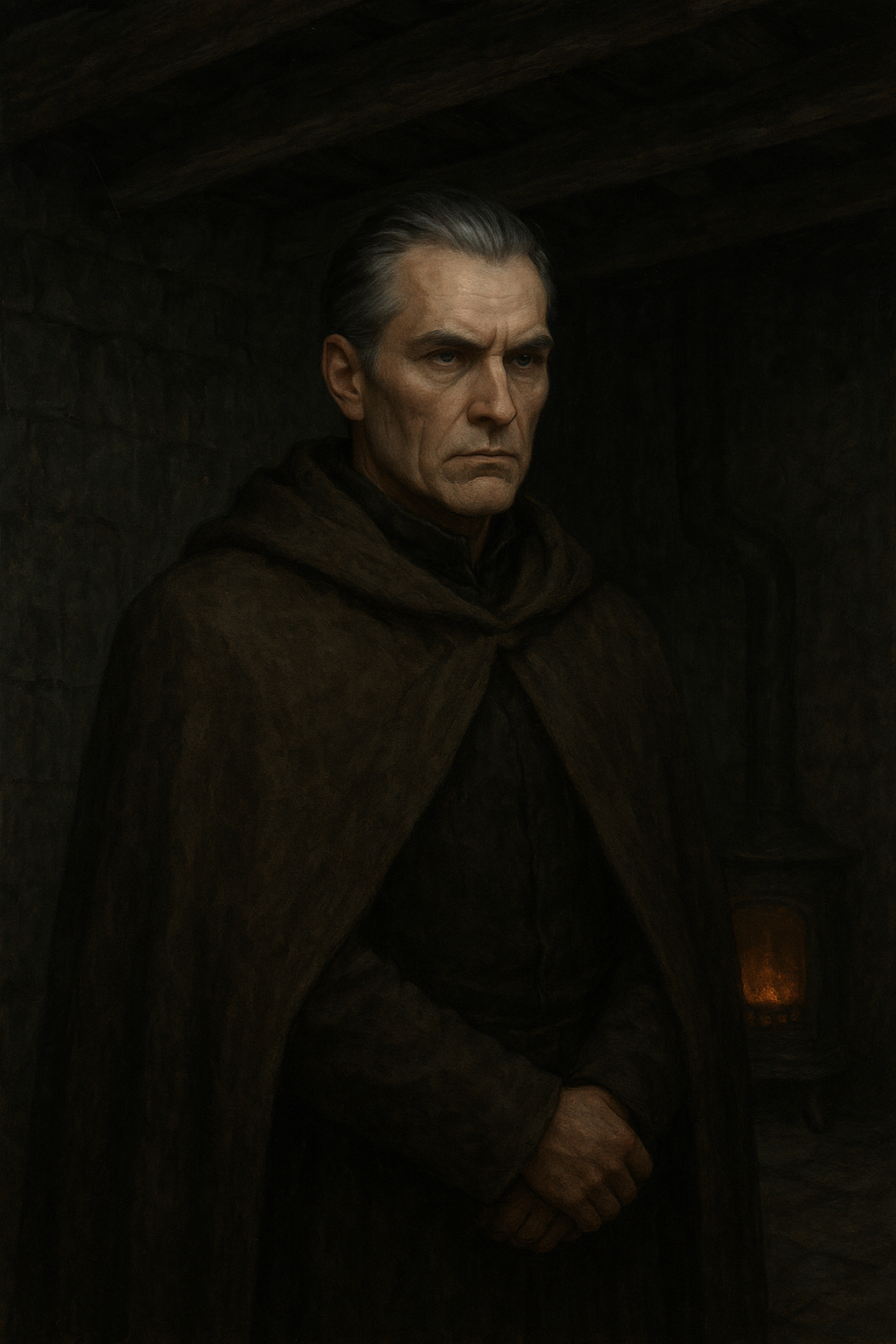The silence was broken.
At first, it was just a beat. A distant pulse, muffled by the darkness. Then another. Rhythmic, slow, like a drum submerged in the void. For an indefinite time, there was nothing else—only that remote sound, like the breath of something that existed but did not move.
Then the light came.
Not violent, not sudden, but inevitable. A barely perceptible spark, a faint reflection spreading through the darkness. It was uncertain, like the first light of dawn behind the mountains, too weak to banish the night but strong enough to make it fragile.
And in the indistinct glow, shadows began to take shape.
Dawn had not yet broken when Eric opened his eyes.
The room was cold. Moisture had gathered in the corners of the ceiling, dripping slowly along the beams blackened by time. The fire in the small iron stove had nearly gone out, leaving only an orange glow among the ashes.
He rose silently. His knees creaked faintly, but he did not stop. He put on his cloak with practiced gestures, wrapping himself in the rough, heavy wool as if it could shield him from thought.
His hair, dark with the first traces of silver at the temples, was combed back with military precision. His face, defined by a firm jaw and clear, impassive eyes, seemed carved from ice.
Eric Dalten, Crown Counselor, veteran of unrecorded wars and power struggles too ancient for the chronicles. He was not born noble, but he had earned every rank through strategy and silence.
Ten years ago, no one had bet on him. He came from no great family, had no patrons. Yet now he sat again on the Council of Five, the only member ever re-elected in the history of the Republic.
He did not want this second term. He had said so. He had repeated it. But the alternative was leaving space for ambitious amateurs, nobles seeking glory, or fanatics devoted to the New World. And the Republic could not afford that.
Eric did not believe in miracles—but that was what they called him: the man of miracles. In ten years, he had ended three internal crises, reorganized the port network, and calmed a nobility that always seemed on the verge of civil war.
But now the real work was beginning. The New World was no longer a promise—it was a bomb. And it was about to explode.
On the desk, next to an open map, lay two sealed letters and a paper knife. He ignored them for a moment. He approached the window. Outside, the day was still deciding whether to be born.
The city slept. Only a few late lights still glimmered in the higher alleys. The towers of the citadel were shrouded in low fog, and beyond the walls, the outlines of the borderlands appeared, the ground gray with frost and silence heavy with its own weight.
Closer, just outside the capital, the great dark abyss—a perfectly circular crater two hundred meters in diameter—gaped in the earth like an ancient, inexplicable wound.
A bottomless abyss, as it was called. Not rhetoric, but simple fact: no one had ever determined its depth.
Over the years, dozens of expeditions had tried to explore it. Engineers had attempted to lower ropes hundreds of meters long, but each time, the rope vanished into the void without ever touching a bottom or offering resistance. Torches, thrown down to observe their descent, were swallowed by darkness within seconds, as if a thick black fog extinguished them halfway. Even stones cast into the abyss returned no sound, no rebound, no impact. Only silence.
Others had attempted to carve staircases along the crater walls. The first hundred meters offered some hope: the rock was hard but workable. For weeks, stonemasons and engineers carved steps and platforms. But then the stone changed.
Not in appearance—it remained rough, gray, seemingly ordinary—but in substance. With every meter deeper, it became more resistant, as if something in its veins was hardening. Tools chipped, tips wore out quickly. To carve a single step now took days, then weeks.
After three hundred meters, work was halted. Costs had become unsustainable, accidents frequent.
Many men lost their lives in these attempts. Some fell. Others, descending into the depths, never returned. No bodies were found, nor was any scream ever heard.
Over time, the authorities stopped funding new explorations. Too expensive, too dangerous. The crater was fenced off, watched by a few bored soldiers. Yet rumors persisted. Some claimed to see lights moving in the depths at night; others swore they saw birds avoiding the area as if afraid of something humans could not perceive.
And then there was the echo.
A deep, slow sound, almost a muffled heartbeat, rising from below in irregular rhythms. It seemed distant, yet present, as if something breathed down there. Some swore they heard words. Others, screams. But none of these testimonies were ever verified.
Eric, like many others, had read every report. He knew every technical detail, every failed attempt, every superstition. Yet what most unsettled him was its absolute stillness. In a world that was changing, expanding toward the New World, facing tides of disorder and ambition, that hole remained. Immobile. Inert. Yet ever-present. Appearing out of nowhere hundreds of years ago.
A mystery that demanded no answers, only reminding those who looked at it how fragile the surface of human certainty truly was.
That hole was not just a natural phenomenon, Eric felt. It was an open wound, a secret hidden beneath the skin of the kingdom, something defying all knowledge and threatening to awaken at the least opportune moment.
Despite everything, the kingdom could not afford to ignore it. For now, though, it had to remain in the background—a dark thought creeping among the many problems stirring the court and the struggle for the New World.
In those days, the Council would meet.
Five representatives. Elected every ten years. No king. No crown. Only duty and office. And now they had to decide how to manage the New World.
The situation was clear.
Ships vanished. Entire crews disappeared. Supplies lost. Routes were unstable. Monsters—because no better term had yet been found—moved beneath the surface. Enormous, silent, invisible. And the ocean, once a source of life, was becoming a deadly risk.
And then there was the nobility. Frightened. Concerned that the New World would upset the balance. That new wealth would fall into the wrong hands. That old families would lose ground. As always, they wanted not solutions, but guarantees. Advantages. Protections.
Eric already knew the script.
Some councilors would call for caution. Others, investment. Someone would invoke force. All would speak too much.
But he would listen. One by one. As always.
Because even amid chaos, someone had to hold the line.
Eric knew it, but only now did he truly feel the weight.
The kingdom was more restless than ever.
For a century, the New World had become everyone’s dream and curse. Unexplored lands, rich in resources and mysteries, a potential for power capable of shaking the kingdom’s very foundations. Yet expeditions were slow, dangerous, and ships often disappeared, swallowed by the depths, prey to monsters never truly seen but universally feared.
The nobles were divided. Some saw the New World as the key to a glorious future; others feared it would bring only chaos and disorder.
Eric studied the map with a cold gaze. Every line, every mark, was a piece in a game larger than himself.
He set the letters aside on the desk, yet his mind remained elsewhere. The thought that had weighed on him for days pushed forward, insistent and sharp.
“The Duke of Tern… that man unsettles me.”
“He appeared out of nowhere, and no one seems to remember where from. A decade ago, his name wasn’t spoken; now he sits among the most powerful lords of the continent, as if he had always been there.”
The nobility is slow, viscous. It takes generations to rise, to be accepted. Yet this man had slipped into the heart of power like a blade between ribs: silent, swift, lethal. He had lands, armies, influence. And above all, respect.
“He has a cunning that is not inherited. It sharpens with living. Yet no one knows his past. No reliable records of his youth. No known mentor, no military school, no passage through capitals where influential men are shaped.
“It’s as if he was built, piece by piece, and only when complete did he allow himself to be seen.”
Eric tightened his cloak around his shoulders as he crossed the threshold of his residence. The morning air was still biting, the cold slipping between the stones of the streets and clinging to the bones. The first lights of dawn filtered through the pointed rooftops of the capital, and fog clung to the alleys like an old man reluctant to leave.
Two guards awaited him at the entrance, silent. They recognized him with a nod and joined him on the walk toward the High Hall.
The path was short, but long enough for thought. Eric walked with a decisive step, his boots lightly echoing on the damp pavement, yet his mind was elsewhere. Inevitably, it returned to the New World.
A century had not been enough to understand what had truly been found.
It was not just a distant, rich land. It was something different. The terrain itself, the creatures, the inverted seasons, plants glowing at night as if holding the sun’s light. Not natural. Not entirely. Each expedition brought new unknown minerals, essences defying known alchemical laws, animals with hollow bones and eyes too large.
And then the losses.
Every updated map demanded blood. Every port built on those coasts had been paid for with drowned, missing, or devoured bodies. Official chronicles spoke of “logistical difficulties,” “expected dangers.” But he had read the original reports. Noted the hurried sketches drawn by trembling hands. The obsessive use of words like presence, movement underwater, shapes impossible to measure.
Some captains returned changed. Eyes lost, gaze broken. They had served for years, through wars and revolts, but that journey had shattered them. No one spoke openly. Glory was a garment without creases.
Politics wanted the New World conquered. A possession, a mine, a promise. But Eric could not stop thinking it was, above all, a mirror.
A place where the world revealed what lay hidden in its depths. Where what was believed known slowly deformed, becoming unrecognizable.
Finally, they reached the stone doorway of the High Hall. Two colossal statues guarded the entrance, figures draped in the cloaks of justice and wisdom, sculpted centuries ago. An ancient lie as old as the Republic itself.
Eric paused briefly before the still-closed doors.
In the New World, he thought, the old laws no longer apply.
But here… they insist on behaving as if nothing had changed.
He nodded to the guard.
“Open. It’s time.”

